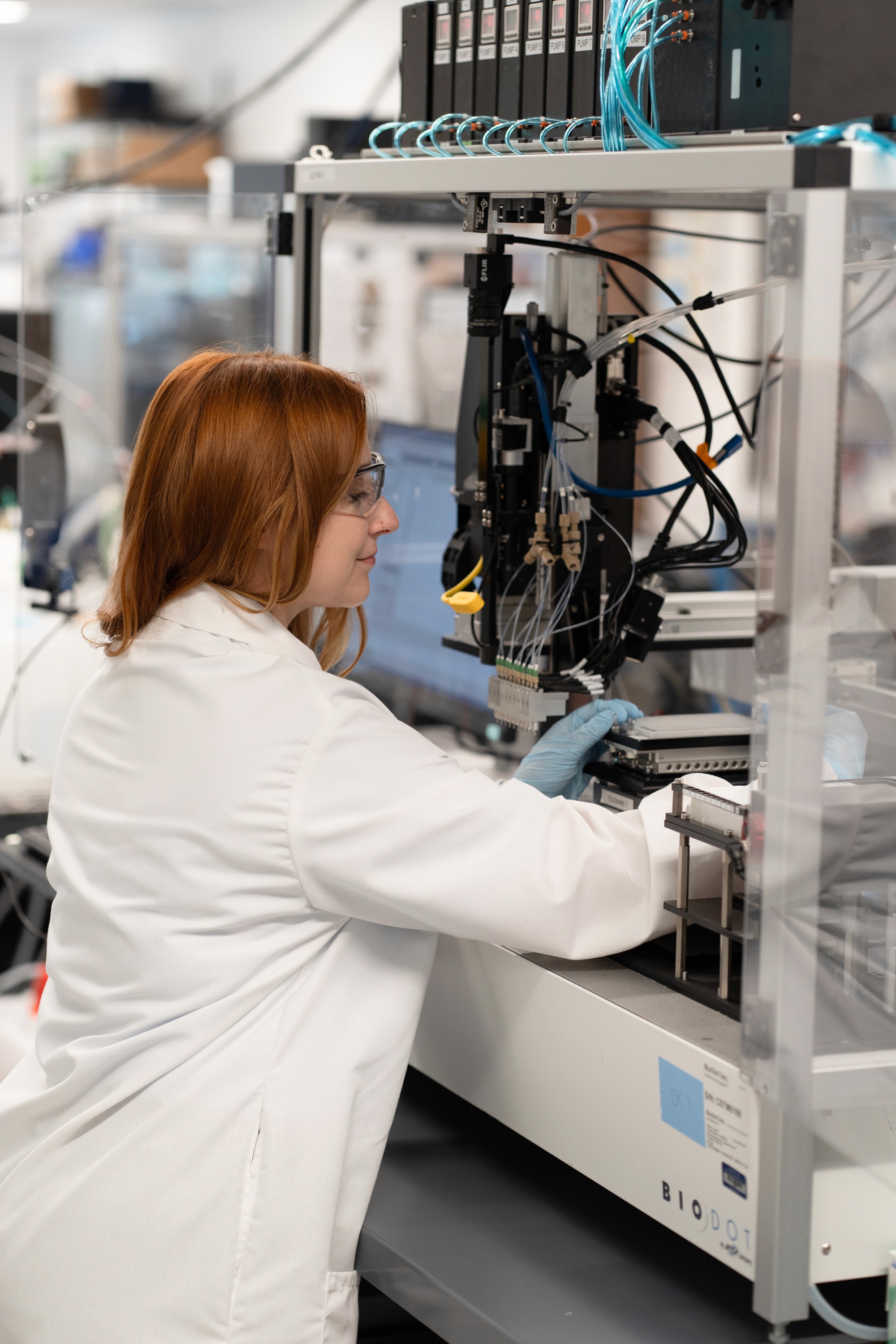Towards Longer, Purer Oligonucleotides Thanks to Enzymatic DNA Synthesis
Molecular Assemblies’ Fully Enzymatic Synthesis™ enables scientists to synthesize DNA fragments previously unobtainable
Oct 8, 2024
[DALL-E]
In the 1980s, Bill Efcavitch played a pivotal role in commercializing chemical DNA synthesis at Applied Biosystems, which enabled the production of short (20-80nt) DNA oligonucleotides, the basic building blocks for modern genomics. Years later, he played a role in creating the sequencers used to map the human genome for the first time. Efcavitch knew that although DNA sequencing has allowed scientists to read and understand DNA more completely, there would be a time when scientists would want to write longer pieces of DNA for applications like NGS or genetic engineering. However, he also knew that chemical synthesis wasn’t going to cut it.
In response to these challenges, Efcavitch founded Molecular Assemblies in 2013, aiming to rethink DNA synthesis by turning to nature, leveraging enzymes to synthesize oligos with lengths and purities unattainable through chemical methods. One enzyme in particular, terminal deoxynucleotidyl transferase, or TdT for short, caught his eye.
Evolving TdT
“TdT is the only natural enzyme that can write DNA from scratch, and nature has designed it over a lot of years,” says Larry Stambaugh, Chairman of the Board at Molecular Assemblies. However, harnessing this enzyme’s capabilities for fast and accurate DNA synthesis was far from plug-and-play.

“As is, TdT will incorporate any free nucleotides pretty indiscriminately. For DNA writing to work, we need the reaction to be both precise and well controlled,” says Phil Paik, the company’s Chief Technology Officer. For this, they turned to a modified set of nucleotides outfitted with a blocking group specifically designed to prevent the addition of more than one nucleotide at a time. To use these blocked nucleotides, however, the Molecular Assemblies team first needed to evolve TdT to accept them and then incorporate them into a growing DNA molecule with exceptionally high efficiencies. Then, the rest of the process is simple: Add one nucleotide, remove its blocking group, then rinse and repeat.
Molecular Assemblies didn’t just stop there. They evolved TdT even further to overcome challenging sequences: those with high GC content, long homopolymers stretches, repetitive regions, and sequences that would otherwise cause the growing DNA strand to self-hybridize. These characteristics make it difficult to synthesize DNA accurately and efficiently. By evolving the enzyme to be thermostable, the team is able to perform synthesis reactions at upwards of 70°C, where all of those sequence complexities literally melt away.
By the summer of 2022, and after many rounds of directed evolution and iterative testing, Molecular Assemblies had their answer – a process called Fully Enzymatic Synthesis (FES™), supercharged with a TdT variant capable of writing DNA at 99.9% efficiency, regardless of sequence complexity.
Moving Past Chemical Synthesis
With their enzyme finalized and process optimized, Molecular Assemblies became the first to enable the synthesis of oligos over 200 nucleotides, lengths that are unattainable with chemical synthesis. Due to the overall lower efficiencies of the chemical process, a diminishing percentage of the desired product remains with repeated rounds of syntheses. For example, 200mers produced at even 99.5% efficiency would only be 36.7% pure. Extend that out to 450nt, and that number drops to 10%, where any full-length products would be amongst a swath of contaminating sequences. “If you attempt to go further with that process, you'll basically have nothing left at the end,” said Paik.
While purification techniques are available, they work with varying degrees of success and become ineffective at longer lengths. Add to that the increased time and cost, and it quickly becomes an unviable option.
Synthesizing long oligos with Molecular Assemblies’ evolved TdT is a stark contrast to chemical synthesis. “We reported the data at SynBioBeta 2024 on a 450mer with a purity of 90%. And we could write it in under five days,” says Stambaugh.
Longer Oligos, Faster and Purer
“Something that is unique to Molecular Assemblies is that our optimization has been focused on oligos, the fundamental building blocks for all of biology,” says Stambaugh. While the field has historically used short oligos for molecular cloning and PCR, newer areas of CRISPR gene editing, cell and gene therapies, and NGS are trending toward longer oligos. This is precisely in the sweet spot for Molecular Assemblies, as they aren’t looking to compete in short-strand synthesis such as primers and probes but rather targeting larger pieces of DNA between 100-500 nucleotides.

These longer single-stranded oligos are useful for those designing donor template DNA or guide RNAs for CRISPR editing or for those cloning complex constructs that would otherwise be difficult to perform. Molecular Assemblies’ oligos will also facilitate gene assembly, as there are fewer fragments to piece together, and the fragments start with much higher purity. For cases where gene assembly might be difficult, Molecular Assemblies can synthesize DNA with these complex regions positioned within the middle of the oligo and away from overlapping regions between oligos to facilitate assembly. An example of this method is templates used for mRNA vaccines, which require a long poly-A tail of 100-250 nucleotides that is typically added by a separate process. “Because we can write well past 200mers, we can hide the poly-A tail within an oligo and have it installed during the assembly process,” says Stambaugh.
Toward a More Efficient, Pure Synthesis
Although a 99.9% efficient FES process sounds hard to beat, optimization doesn’t stop there. “With every part of the manufacturing process contributing to that overall efficiency, we continue to optimize our performance to push the boundaries of what’s possible,” says Paik.
“We're writing oligos that no one else can write,” says Stambaugh.


















